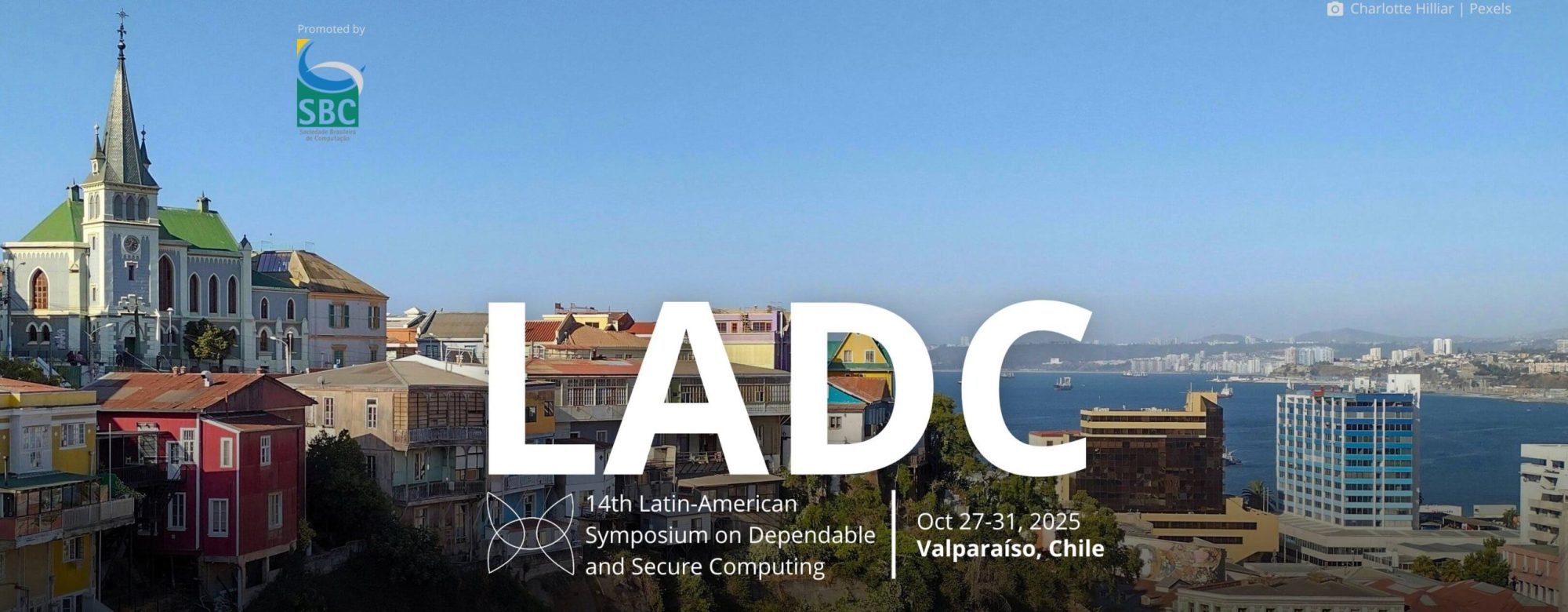Important Dates
- Paper submission:
July 31, 2025August 08, 2025 (FIRM) - Author notification: August 29, 2025
- Camera Ready: September 08, 2025
- Symposium: October 27-31, 2025
About the LADC Student Forum
The Latin-American Symposium on Dependable and Secure Computing (LADC) is the major event on computer system dependability and Secure Computing in Latin America. LADC 2025 will feature technical sessions, workshops, tutorials, fast abstracts, keynote talks from international experts in the area, and an industrial track. The symposium’s scope includes recent research results on software and system dependability. The Symposium is promoted by the Special Committee on Fault-Tolerant Systems (CE-TF) of the Brazilian Computer Society (SBC), and ranked as Qualis-Capes A4.
LADC’2025 will be held co-located with CLEI 2025 (Conferencia Latinoamericana de Informática) in Valparaíso, Chile, from October 27-31.
The Student Forum at LADC welcomes fresh and exciting ideas from students working in the field of dependable and secure computing. The forum is a great opportunity for students to present and receive early feedback on their research objectives, methods, and preliminary results.
Topics
Major topics include, but are not limited to:
- Dependability of hardware: fault-tolerant architectures, multi-core
systems, virtualization, nanoscale computers, hardware dependability
assessment; - Dependability of software: frameworks and software architectures for
dependability, runtime monitoring, adaptation, model-driven dependability
engineering, testing, verification, and software certification; - Dependability of networks: LAN, WAN, mobile, ad-hoc, sensor networks,
protocols; - Dependability of data: storage, databases;
- Dependability of maintenance: tuning performance and availability,
security configuration; - Dependability and human issues: human-computer interaction, management of
complex systems; - Security: foundations, policies, protocols, access control, intrusion
detection, intrusion tolerance; - Safety: incidents & accidents, risk perception and analysis,
safety-critical applications and systems; - Critical infrastructure protection;
- Algorithms and methods for dependable and secure computing;
- Dependability and security modeling, measurement and benchmarking.
Submission Guidelines
Student papers must have a student as the first author. The student’s advisors may be co-authors of the submission. The paper should contextualize the topic, present preliminary results, and identify future research directions.
For review, students should clearly identify their level of study (undergraduate or graduate). This will help ensure that submissions are evaluated fairly. The level of study can be later removed for the final version.
Submitted papers should be at most 11 pages in length, and formatted using the LaTeX or Word templates provided at https://www.springer.com/gp/computer-science/lncs/conference-proceedings-guidelines. Accepted papers will be published by Springer.
Students should submit papers as a Portable Document Format (PDF) file through JEMS: https://jems3.sbc.org.br/ladc-sf2025.
Accepted papers can be presented both at the conference as well as remotely. Remote presenters will be able to present at and attend the Student Forum through a virtual room. However, remote presenters will not be able to participate in the main track, keynotes, and workshops since these will not be streamed.
Comments and questions should be directed to the Student Forum Chair.
Chair
Rafael Obelheiro (UDESC, Brazil) – rafael.obelheiro[at]udesc.br
Program Committee
- Allan Freitas (IFBA, Brazil)
- Alírio Sá (UFBA, Brazil)
- Edson Tavares de Camargo (UTFPR, Brazil)
- Eduardo Alchieri (UnB, Brazil)
- Fernando Dotti (Pontifical Catholic University of Rio Grande do Sul, Brazil)
- Gustavo Callou (UFRPE, Brazil)
- Luciana Arantes (Sorbonne Université, France)
- Lásaro Camargos (Weilliptic Inc., USA)
- Odorico Mendizabal (UFSC, Brazil)
- Paulo Coelho (UFU, Brazil)
- Sérgio Gorender (UFBA, Brazil)
- Tiago Heinrich (Max-Planck Institute for Informatics, Germany)
- Vinicius Fulber-Garcia (UFPR, Brazil)

